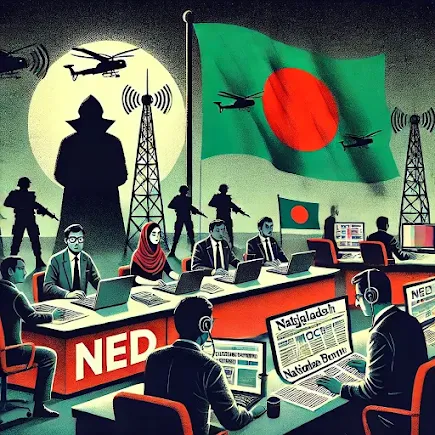The Controversy Over NED Funding in Bangladesh: Accountability, Media Narratives, and Political Influence
The Controversy Over NED Funding in Bangladesh: Accountability, Media Narratives, and Political Influence
Read in Bangla here 👉: বাংলায় পড়তে এখানে ক্লিক করুন
What is NED?
The National Endowment for Democracy (NED) is a U.S. government-funded nonprofit organization that claims to promote democracy, human rights, and free markets worldwide. However, its activities often align with U.S. foreign policy objectives, leading to accusations that it serves as a tool for regime change and political interference in sovereign nations.
WHY did NED do this ?
The National Endowment for Democracy (NED) operates under the guise of promoting democracy and human rights, but its activities often align with U.S. foreign policy interests. In the case of Bangladesh, NED’s involvement appears to serve several strategic purposes:
1. Weakening Sheikh Hasina’s Government
Sheikh Hasina’s government has maintained a strong stance against both Islamist extremism and Western-backed NGOs that interfere in Bangladesh’s internal affairs. Since her administration is seen as independent and not fully aligned with U.S. interests, efforts to destabilize her rule could benefit Western geopolitical strategies in South Asia.
2. Protecting Pro-Western Figures like Muhammad Yunus
Nobel laureate Muhammad Yunus, a long-time critic of Sheikh Hasina’s government, has significant backing from Western elites. NED-funded media platforms like Netra News have allegedly worked to defend Yunus and discredit government actions against him, portraying him as a victim of political persecution rather than addressing the financial and legal controversies surrounding him.
3. Supporting Opposition Forces
The NED often funds opposition groups under the banner of “pro-democracy” movements. In Bangladesh, some of these groups have links to Islamist factions, which have a history of using violence to push their agendas. By shaping media narratives, NED helps legitimize these groups as “freedom fighters” rather than exposing their extremist ties.
4. Countering China’s Influence in South Asia
Bangladesh has been strengthening economic ties with China through infrastructure projects, trade agreements, and defense cooperation. The U.S., wary of growing Chinese influence in the region, may use NED to fund media outlets that create instability, pressure the government, and promote leadership more favorable to Western interests.
5. Controlling the Media Narrative
NED-backed media platforms, such as Netra News, play a key role in shaping public perception. By selectively reporting on issues like communal violence and corruption, they attempt to manipulate the political landscape in Bangladesh. This helps create unrest and justifies foreign intervention under the pretense of “protecting democracy.”
Lack of Accountability in NED-Funded Activities
The National Endowment for Democracy (NED), a U.S.-funded organization that claims to promote democracy worldwide, has been under scrutiny for its role in Bangladesh. Former U.S. State Department official Mike Benz, now with the Foundation for Freedom Online, has pointed out a complete lack of accountability in NED-funded initiatives, particularly in shaping political narratives and influencing regime changes in Bangladesh (Foundation for Freedom Online).
The Role of Netra News in Bangladesh’s Media Landscape
One of the most significant NED-funded projects in Bangladesh is Netra News, a Sweden-based investigative journalism platform. While it has reported on government corruption and human rights abuses, critics argue that it has also played a role in shaping narratives that align with certain political interests. For instance, a report published by Netra News downplayed allegations of communal violence against Hindus, suggesting alternative causes for the deaths of nine Hindu men (Netra News).
Defending Yunus and Alleged Islamists?
Critics also claim that NED funds have been used to defend Nobel laureate Muhammad Yunus while simultaneously protecting Islamist perpetrators of communal violence. These allegations suggest that the media backed by NED funding may be influencing public perception to shield certain individuals and groups from accountability (Netra News).
The Bigger Picture: Foreign Influence and Sovereignty
The controversy raises questions about foreign influence in Bangladesh’s domestic politics. While organizations like the NED argue that they promote democracy, their activities in Bangladesh indicate a more complex reality—one where media narratives are carefully crafted to serve broader geopolitical interests. The alleged bias in reporting and selective defense of certain figures underline concerns about the true nature of NED’s involvement in Bangladesh.
Conclusion
The debate over NED funding in Bangladesh highlights the need for greater transparency and accountability in foreign-funded media operations. While investigative journalism is crucial for democracy, it should not serve as a tool for political interference. Bangladesh, like any sovereign nation, deserves a media landscape that prioritizes factual reporting over hidden agendas.

.jpeg)
Comments
Post a Comment